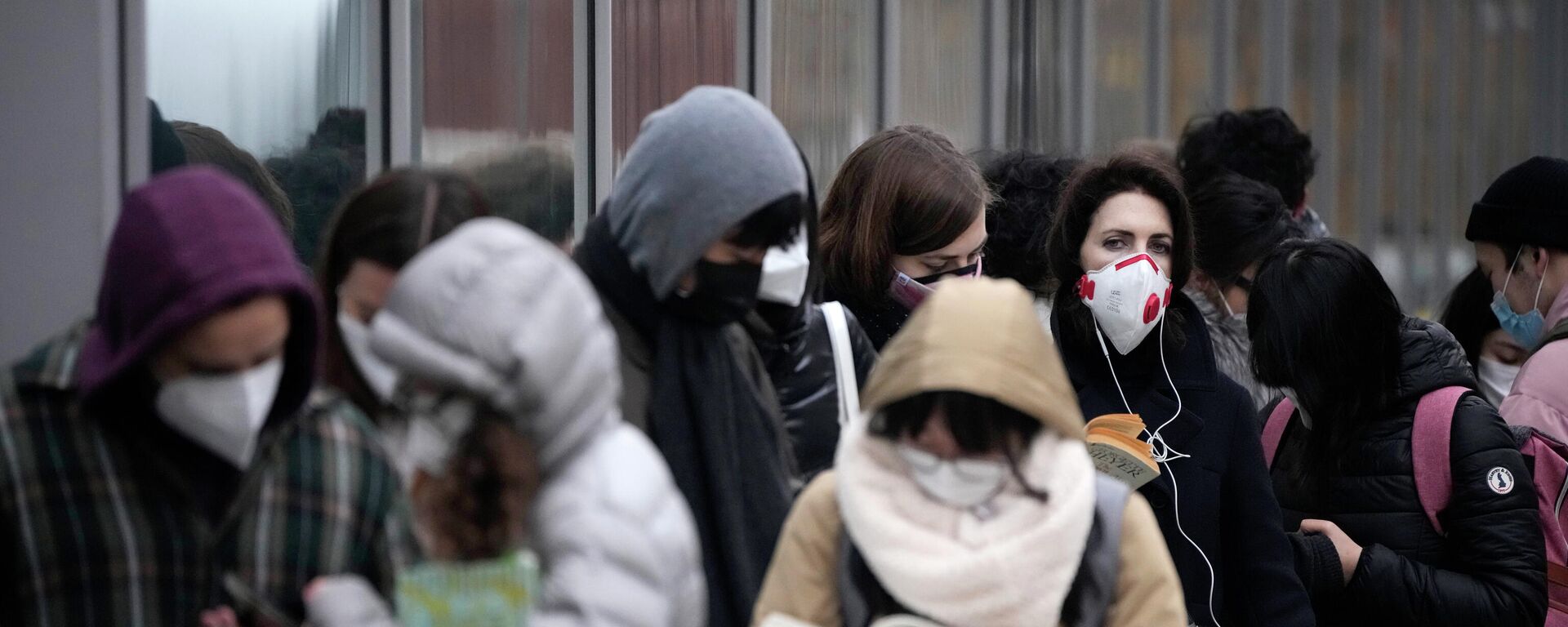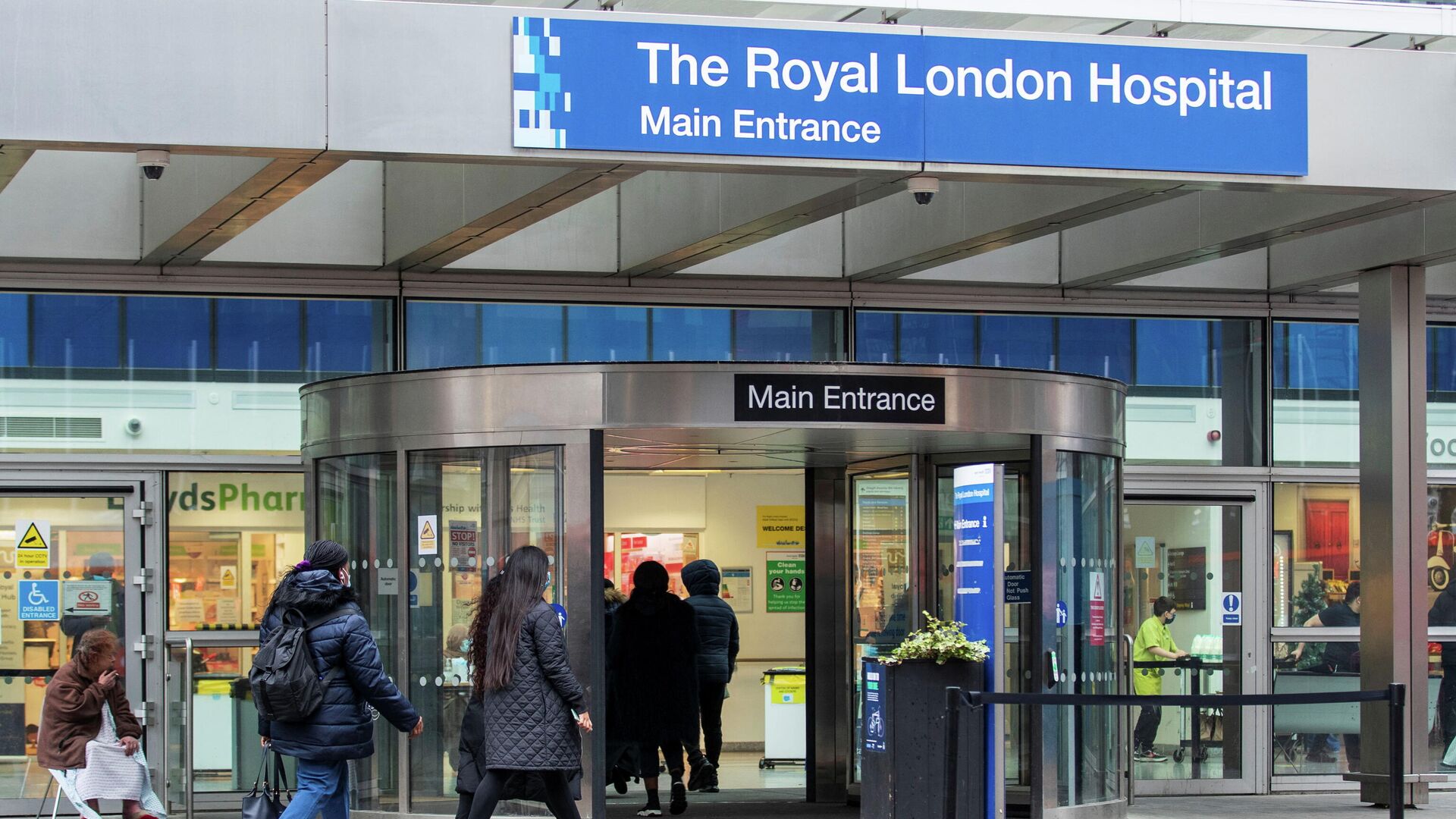https://sputnikglobe.com/20220103/uk-minister-says-nothing-in-data-to-prompt-more-covid-19-restrictions-despite-nhs-warnings-1091990597.html
UK Minister Says 'Nothing in Data' to Prompt More COVID-19 Restrictions, Despite NHS Warnings
UK Minister Says 'Nothing in Data' to Prompt More COVID-19 Restrictions, Despite NHS Warnings
Sputnik International
Cabinet Office minister Stephen Barclay believes there is no need for further COVID-19 restrictions in England this week thanks to Prime Minister Boris Johnson’s “Plan B”, reported Sky News.
2022-01-03T08:42+0000
2022-01-03T08:42+0000
2023-05-28T15:17+0000
boris johnson
sajid javid
stephen barclay
covid-19
omicron strain
united kingdom (uk)
https://cdn1.img.sputnikglobe.com/img/07e5/0c/1f/1091945408_0:0:3071:1728_1920x0_80_0_0_01b97afb0674382b21b9d22a2200df36.jpg
Cabinet Office minister Stephen Barclay believes there is no need for further COVID-19 restrictions in England this week thanks to Prime Minister Boris Johnson’s “Plan B”, reported Sky News.When asked about the likelihood of additional coronavirus restrictions for England being announced in the coming week, Barclay said:Barclay hailed the coronavirus rules, such as mask-wearing indoors, working from home if it's reasonable to do so, increased testing and vaccine certificates for large events and in nightclubs, which came into effect under Plan B in early December to last until 26 January 2022.Health Minister Ed Argar similarly said on Sunday that he saw “nothing” in the current data to prompt further measures.Meanwhile, over 90% of people in the UK over the age of 12 have received their first vaccine jab, and 82.4% have had their second inoculation dose.According to recent UK Health Security Agency (UKHSA) data, unvaccinated people were up to eight times more likely to be admitted to hospital than those fully jabbed.As pupils return to secondary school for a new term after the festive break, the government has announced that facemasks should be worn in classrooms, with additional air cleaning units provided to schools and colleges. Education Secretary Nadhim Zahawi outlined the measures for schools in a Twitter thread on Sunday.‘Intensifying ‘Health Emergency’This comes as the National Health Service (NHS) leaders have warned about an intensifying “health emergency” as the health service is operating "beyond full stretch".Current hospital admissions in England have soared to their highest level since January 2021, as a further 137,583 lab-confirmed COVID-19 cases were recorded in England and Wales as of 9am on Sunday. Data published by the Office for National Statistics showed 174,000 deaths registered in the UK with the coronavirus mentioned on the death certificate.Chris Hopson, the chief executive of NHS Providers, said staff was under “arguably more pressure” than this time last year.He wrote on Twitter that the NHS was “preparing for worst & hoping for best.”However, he added that “long-term NHS capacity issues must be addressed.”On Sunday the United Lincolnshire Hospitals NHS Trust had reportedly declared a “critical incident” linked to “extreme and unprecedented” staff shortages.UK Health Secretary, Sajid Javid, acknowledged that the surge of the more transmittable Omicron strain of the respiratory disease would “test the limits of finite NHS capacity even more than a typical winter”. However, he insisted that further restrictions in England must be a “last resort”. Javid added that the UK must prepare to “live alongside” coronavirus in 2022.MPs are due to return to the House of Commons on 4 January following the Christmas recess, with the government to review its "Plan B" measures.
https://sputnikglobe.com/20220102/uk-government-preparing-plans-to-avoid-public-sector-chaos-over-covid-19---reports-1091972994.html
united kingdom (uk)
Sputnik International
feedback@sputniknews.com
+74956456601
MIA „Rosiya Segodnya“
2022
News
en_EN
Sputnik International
feedback@sputniknews.com
+74956456601
MIA „Rosiya Segodnya“
Sputnik International
feedback@sputniknews.com
+74956456601
MIA „Rosiya Segodnya“
covid-19 omicron
UK Minister Says 'Nothing in Data' to Prompt More COVID-19 Restrictions, Despite NHS Warnings
08:42 GMT 03.01.2022 (Updated: 15:17 GMT 28.05.2023) Amid speculations of possibly wider COVID-19 restrictions being introduced in England as the Omicron strain of the virus is responsible for a surge in cases, on 4 January the government is set to review its Plan B measures, not due to expire until 26 January.
Cabinet Office minister Stephen Barclay believes there is no need for further
COVID-19 restrictions in England this week thanks to Prime Minister Boris Johnson’s “Plan B”, reported Sky News.
When asked about the likelihood of additional coronavirus restrictions for England being announced in the coming week, Barclay said:
"We don't think the data supports that at this stage. Of course we keep the data under review but we've seen significant behaviour change as a result of Plan B.”
Barclay hailed the coronavirus rules, such as mask-wearing indoors, working from home if it's reasonable to do so, increased testing and vaccine certificates for large events and in nightclubs, which came into effect under Plan B in early December to last until 26 January 2022.
"The widespread use of testing is an illustration of the fact the British public are taking sensible steps to take themselves safe, to keep friends and family safe. That's why there has been such a demand for testing in recent weeks. So that, combined with the booster programme, is the key way as a country we will avoid the need for further measures."
Health Minister Ed Argar similarly said on Sunday that he saw “nothing” in the current data to prompt further measures.
“Restrictions or curbs must be the absolute last resort. I’m seeing nothing at the moment in the data I have in front of me, in the immediate situation, that suggests a need for further restrictions. But that data changes day by day,” he said on Times Radio.
Meanwhile, over 90% of people in the UK over the age of 12 have received their first vaccine jab, and 82.4% have had their second inoculation dose.

2 January 2022, 05:59 GMT
According to recent UK Health Security Agency (UKHSA) data, unvaccinated people were up to eight times more likely to be admitted to hospital than those fully jabbed.
As pupils return to secondary school for a new term after the festive break, the government has announced that facemasks should be worn in classrooms, with additional air cleaning units provided to schools and colleges. Education Secretary Nadhim Zahawi outlined the measures for schools in a Twitter thread on Sunday.
‘Intensifying ‘Health Emergency’
This comes as the National Health Service (NHS) leaders have warned about an intensifying “health emergency” as the health service is operating "beyond full stretch".
Current hospital admissions in England have soared to their highest level since January 2021, as a further 137,583 lab-confirmed COVID-19 cases were recorded in England and Wales as of 9am on Sunday. Data published by the Office for National Statistics showed 174,000 deaths registered in the UK with the coronavirus mentioned on the death certificate.
Chris Hopson, the chief executive of NHS Providers, said staff was under “arguably more pressure” than this time last year.
He wrote on Twitter that the NHS was “preparing for worst & hoping for best.”
However, he added that “long-term NHS capacity issues must be addressed.”
On Sunday the United Lincolnshire Hospitals NHS Trust had reportedly declared a “critical incident” linked to “extreme and unprecedented” staff shortages.
UK Health Secretary, Sajid Javid, acknowledged that the surge of the more transmittable Omicron strain of the respiratory disease would “test the limits of finite NHS capacity even more than a typical winter”. However, he insisted that further restrictions in England must be a “last resort”. Javid added that the UK must prepare to “live alongside” coronavirus in 2022.
MPs are due to return to the House of Commons on 4 January following the Christmas recess, with the government to review its
"Plan B" measures.




